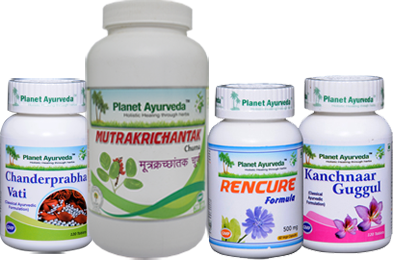These are the infections related to urinary tract infections (UTIs). They coexist with dysuria, indicated as burning sensation during urination. These diseases are caused by the bacterial infections. Every one want treatment where there is no worries about side effects. Ayurvedic treatment for cystitis plays wonderful role in taking care of all the bothering symptoms. One can take herbal remedies on regular basis to treat root cause. Always consult an Ayurveda expert for proper guidance so that you move on a right path.
It is a lower urinary infection, also known as bladder infection. It is most common in women aged 20-50 years. The infection starts when bacteria enters into the urethra through urinal opening during sexual intercourse. The other possibility is when girls wipe their private parts from back to front using toilet tissue. Once bacteria entered into urethra, it easily gets into the bladder and starts infections.
In male, it generally occurs after the age of 50 years and is associated with the enlarged prostrate or prostrate infection.
It is the infection of bladder, which is caused by bacteria mainly. They enter into bladder through urethra and cause severe infections. The prolonged infection can spread to the kidney.
Women are more prone to get infections than men. Because the urethra of woman is shorter and closer to the anus. The high risk of infection occur during sexual intercourse or using a diaphragm for birth control and sometimes menopause.
Symptoms of Cystitis
- Frequent urination
- Loss of bladder control
- Pain in the lower front portion of the abdomen near bladder
- Cloudy urine with strong odor and bloody urine
- Cloudy appearance of the urine
- Blood in the urine
- Strong or foul smell in urine
- Pain or burning sensation during urination
- Cramping in the lower middle abdomen or back
- Frequent urination
According to the Ayurveda, the basis of pathogenesis is to understand the type of dosha and dushya involved in the development of the disease. There are various factors involved in the aggravation of Vatta dosha particularly apanavata. The causative factors are mutritodakabhakshyasevana, katiskhandaatidharana, atistreesevana, ativyayama, mutravegadharana and nityadrutaprustayana.
Ayurveda emphasizes on the lifestyle, diet and physical activities. The excessive use of madya (alcohol, wine and beverages), matsya (fish) and katuamlalavana rasa (excessive salt, sour and sweet) aggravate the Pitta dosha. Intake of anupamamsa (Non-vegetarian), adhyashana (excessive eating) and ajeernabhojana (irregular eating) aggravates Kapha dosha which results into the reduced state of agni (digestive power). Thereby, all the tridoshas get vitiated. The disturbed Tridoshas and agnimandhya (reduced digestive capacity) results in the excessive production of Ama (toxins), forming samadoshas. These samadosha produces various symptoms of urinary tract infections such as,
- Peetamutrata (yellowish urine)
- Sadahamutra pravrutti (burning micturition)
- Basti and mutrendriya gurutwa (inflammation of bladder)
- Shweta, snigda and picchila mutra (turbid urine with the presence of leucocytes).
Herbal Remedies for Healthy Urinary System by Planet Ayurveda?
There are wonderful natural products for healthy urinary organs with Planet Ayurveda such as:
Dosage
- Mutrakrichantak Churna – 1 Teaspoonful twice daily with water and for best result Boil 1 Teaspoonful in 400ml water until it remains 50-60ml. Filter the preparation with a regular tea strainer and drink. You should use this once in morning 45min. after breakfast and similarly in evening 45min. after dinner. Prepare fresh every time as per this. (1 Jar)
- Rencure Formula – 2 Caps. Twice Daily (2 Bottles)
- Kanchnaar Guggul – 2 Tablets Twice Daily (1 Bottle)
- Chanderprabha Vati – 2 Tablets Twice Daily (1 Bottle)
To buy these Natural Supplements, please visit store.planetayurveda.com
Diet
The habit of Adhyashana (eating before complete digestion of previous food) & ajeerna bhojana (taking food during indigestion) results into reduced state of agni and consequently leads into the formation of Ama (toxin) aggravating the Tridoshas, particularly Pitta dosha. This dosha results in increased urine concentration, altered pH and decreased volume of urine that facilitates the favorable environment for the growth of bacteria.
One has to be aware of taking food which reduces the chances of Pitta dosha and strictly follow a diet relatively:-
- Avoid spicy foods
- Consume water as much as you can
- Add fresh lemon juice, coconut water, juices of orange, sugarcane and pineapple.
- Eat fresh fruits like apple, grapes, peaches and plums

